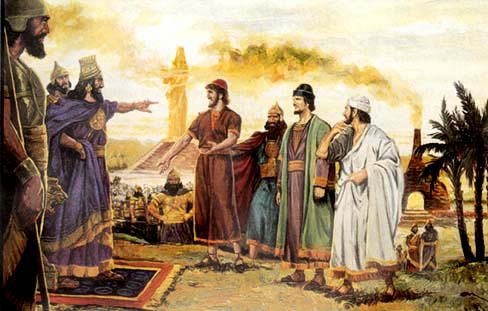| In Chapter 2 of the Book of Daniel, the great
Babylonian king Nebuchadnezzar has a disturbing dream, which none of his
wise men can recount to him or interpret. He is enraged and threatens to
kill all of his wise men. Daniel responds to a difficult and dangerous
situation in faith and courage, boldness and humility. He promises the
king that he will reveal to him his dream and its correct interpretation
(even before he yet received them). First, he goes to his three young friends,
Shadrach, Meshach, and Abednego, and asks them to pray. Then he seeks the
Lord in faith and humility and receives from the Lord both the knowledge
of the dream and its interpretation.
Daniel recounts the dream and its meaning to the king, who is completely
blown away, and places Daniel over his government, much as Pharaoh had
in the case of Joseph. Daniel’s three friends are also given major roles
in government, in which their considerable abilities and their high character
give them increasing prominence. 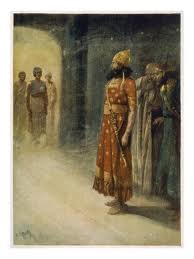
[See text from Daniel 2:47-49] But the
prominence and influence make others jealous, and they become the objects
of an attack – upon themselves and upon their people. The issue is not
small or peripheral, but one of fundamental loyalty to the Lord. They are
threatened with the possibility of losing not only their positions and
their influence, but their very lives. Let’s look at what happened in Babylon
at that time.
Daniel 3:1-13
[see text in sidebar box]
In Chapter 3 verses 12 and 13, we read that Daniel’s three friends,
Shadrach, Meshach, and Abednego, are accused of breaking the king’s commands.
In fury the King demands that they be be brought before him to hear his
verdict. It often happens that when someone is placed by the Lord in a
position to stand out in society, that person becomes a ready target for
those who are jealous of the blessings and the success. Those who experience
such blessings can sometimes make the great mistake of getting attached
to them for their own sake, or of seeing them as the proof that the Lord
is pleased, while seeing difficulty and attack as an indication that they
are making big mistakes. While this can certainly happen (we can all too
easily cause our own problems by our own foolishness), it is also true
throughout the Scriptures that those of God’s people whom the Lord blesses
and causes to prosper are also often attacked and put to the test by his
enemies. In such times of testing, the blend of fidelity, boldness, courage,
and humility are the response of faith that the Lord is seeking from those
who belong to him.
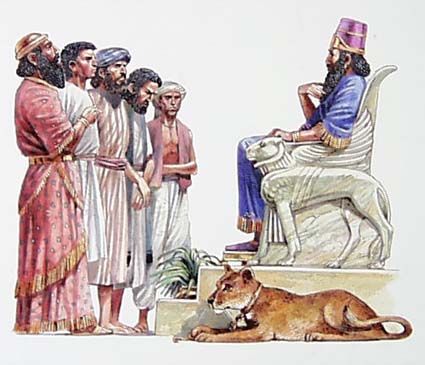
Daniel 3:14-18
[see text in sidebar box]
With great courage, these young men choose to be faithful to the Lord.
Far more so than was the case about keeping the Lord’s dietary laws we
previously looked at in Chapter 1 [see previous article, Part I here].
Now these guys really have something to lose: their good reputation, their
position and influence, their wealth, and even their lives. We might say
to ourselves “Yeah, but how nice to be able to take such a radical stand,
knowing that God is going to intervene in a miraculous and spectacular
way, completely vindicate you, totally defeat your enemies, and bring you
into greater honor and position than ever.” But it wasn’t like that for
Shadrach, Meshach, and Abednego. They didn’t know what God would do. They
left that question entirely up to the Lord. This was about embracing the
spirit of martyrdom, not about doing a spiritual “bungee jump.” They weren’t
saying: “No sweat. It looks really scary, but in fact, nothing bad is actually
going to happen to us.” So you get this adrenaline rush without ever being
in true danger.
They also weren’t taking a desperate stand of saying “OK, Lord. We’re
doing our part. Now you better step up here and do yours.” With the courage
of martyrs, they chose to be faithful to the Lord come what may, and simply
left it to the Lord to decide how he would act on their behalf. Shadrach,
Meshach, and Abednego were clearly ready to be martyrs for the glory of
God – and through the centuries, the Lord has seen fit more often to be
glorified though the death of his saints than in rescuing them. On this
occasion, however, God willed to bring glory to his name through the miraculous
protection of his servants.
I believe that the Lord is looking for a similar response from each
of us in similar circumstances: accepting with courage and boldness
whatever will bring most glory to God. Ready to pay the price to be faithful.
The obvious “wise” thing to do (as far as worldly wisdom goes) would
have been to “lay low” and at least give the appearance of giving in, so
as to not lose their positions of power and influence (as well as their
lives): Perhaps even to give in, justifying the compromise with the idea
that in this way one could stay in favor and in a position of influence
that might prove useful to the Lord’s cause in the future. This response,
of course, would have totally compromised their integrity and would have
constituted a serious sin of idolatry, as well as a failure to give testimony
of their faith before their own people. The three young men don’t fall
into these traps. They rise to the test, and prove faithful and true.
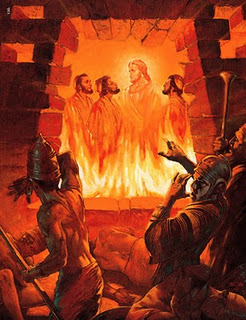
Daniel 3:19-25
[see text in sidebar box]
The king himself, the very man they were seeking loyally to serve,
has put them to the test. He has made an issue of whether their first loyalty
is to him or to God. They respond respectfully, but with absolute conviction
and without hesitation. They make very clear where their first loyalty
lies. The king is infuriated, and orders their destruction – and not merely
the extraordinarily painful death of being burnt alive, but at an intensity
of heat that destroys the men who throw them into the fiery furnace. The
king is a personal witness to two extraordinary things: the three young
men are seen walking about in the furnace and praising God, and a fourth
man is seen to be in there with them!
Daniel 3:26-29
[see text in sidebar box]
God has acted miraculously to glorify himself through the three young
men. The power of God is revealed through the boldness of faith and the
humility of his servants, in such a way that even those who were seeking
to punish them are left praising God, and honoring his people.
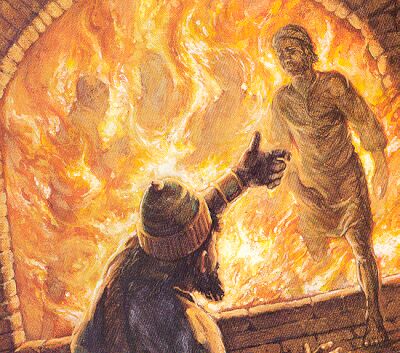
Daniel 3:30
[see text in sidebar box]
The Lord uses the faith and courage of his servants to exalt them,
to place them even higher in the worldly society in which they find themselves.
Is it always like this? No – it depends entirely upon the will and
purpose of God. His servants put themselves in a place to give witness
to his truth, and to be used for his glory.
This final verse of Daniel 3 brings me back to some of my comments from
the first presentation: These young men represent a way of living
in the society in which the Lord places his people along the lines of Jeremiah’s
prophecy (Jeremiah 29:4-7).
Babylon is a society which does not know him, or that refuses to acknowledge
him. Yet, God cares for his people and is concerned for their welfare.
He has used King Nebachudnezzar and the empire of Babylon as his instrument
for the purification of his people, and now he intends to bless his people
as they live in the midst of Babylonian society and culture.
Many faithful Jews in Babylon were probably living very quiet and rather
hidden lives, earning their bread and raising their families. But God called
others of his faithful servants in Babylon to live and serve actively,
and even prominently, in the midst of that society. He called them not
only to serve their own people, but to work for the good of all those among
whom they live.
God did not send them there as “undercover agents” of an enemy that
is working to subvert the reigning order. Nor to be an inert lump in the
midst of the wider worldly society, which has essentially “dropped out”
of any meaningful contact, interaction, service to the broader people among
whom they live. Rather, they were to live as God’s people in exile, living
and serving in a foreign culture, genuinely working for the true good of
those among whom they live and serve, not assimilating into that broader
culture and its ways and values, not dropping out of it, not working to
subvert it, but being completely faithful to God within in, and working
to bring the broader foreign culture into greater relationship to God and
his truth and his ways in whatever ways they can.
Their mission in the broader society does not appear to be specifically
spiritual or religious – they are to work and to serve and to love, and
to bring good to the people among who God has placed them. As they do so,
the Lord will give them opportunity to witness to him and his goodness.
Often, as they do what the Lord is asking of them, they are given the opportunity
to have significant impact in their society, as were Shadrach, Mesach,
and Abednego. Some of his people may become prominent and respected
and influential. In becoming so, they do not in any way compromise their
faith, and they remain perfectly willing to lose any and all benefits,
reputation, and influence in order to maintain their faithfulness to God
and to his call. They suffer for this, and are ready to pay the price.
The Lord is able to take the power of their faithful witness and turn it
into even greater glory for himself, greater victory for his truth and
his people.
Lessons for today
In closing I offer the following considerations for your reflection:
1. Testing
in our lives always looks like a huge hassle and a great misfortune, especially
when we’re right in the middle of it. The enemy, who is also testing us,
wants to overwhelm us with difficulty, or at least with fear of difficulty,
and to talk us out of fidelity. It can look like we’re all alone, taking
the heat. But often, the Lord has his own purpose for allowing the test
to take place. Just as he can glorify himself in and through our successes
and accomplishments, so he can also glorify himself through us as – with
his help and grace – we pass the great tests that are given to us.
When testing comes, our first instinct is often: “How do I get out of
this with the least loss and damage?” The Lord is looking for the response
of the three young men: faith and faithfulness, courage, boldness, humility.
He can use these responses to win a great victory in and through our lives.
Are you also being tested? How? Where is the Lord in the midst of your
test – have you found him? Are you looking for him? What response is he
asking of you in the midst of your trial?
2.
I believe that many of you will be called by the Lord to have influence
and to exercise leadership where you are – not only in the small world
of your community, of a Christian group you are serving, but more broadly.
Some of you are probably already experiencing a certain success, a prominence,
a popularity among your circle of friends in school, at university, at
work. It might be because you are a good athlete, or that you’re smart
in a way that wins the respect of others, or that you are especially pretty
and vivacious. In some cases, the experience of a certain prominence or
popularity in the broader world we live in can lead us to be more careful,
more concerned, more timid, less free to express who we really are in Christ,
more fearful of losing what we’ve gained.
But these three young men are a great example of a different response
in that situation. Enjoying influence, leadership, and popularity
in their society, they didn’t allow these to make them compromise their
fundamental principles, or to be timid and fearful in the face of an attack
on their more important commitments and principles. They were free to be
who they really were. They didn’t compromise, even though they knew that
it could cost them to hold their ground. They were ready, if need be, to
put all on the line for their faithfulness to God.
See Part
1: Going Against the Tide: Lessons in Faith and Courage from the Book of
Daniel, by John Keating
|
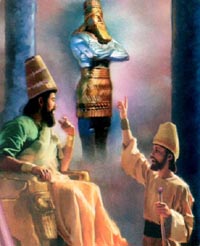
From the Book
of Daniel
Chapter 2:47-49
1
In the third year of the reign of Jehoi'akim king of Judah, Nebuchadnez'zar
king of Babylon came to Jerusalem and besieged it. 2 And the Lord gave
Jehoi'akim king of Judah into his hand, with some of the vessels of the
house of God; and he brought them to the land of Shinar, to the house of
his god, and placed the vessels in the treasury of his god.
Chapter 3
1
King Nebuchadnez'zar made an image of gold, whose height was sixty cubits
and its breadth six cubits. He set it up on the plain of Dura, in the province
of Babylon.
2
Then King Nebuchadnez'zar sent to assemble the satraps, the prefects, and
the governors, the counselors, the treasurers, the justices, the magistrates,
and all the officials of the provinces to come to the dedication of the
image which King Nebuchadnez'zar had set up.
3
Then the satraps, the prefects, and the governors, the counselors, the
treasurers, the justices, the magistrates, and all the officials of the
provinces, were assembled for the dedication of the image that King Nebuchadnez'zar
had set up; and they stood before the image that Nebuchadnez'zar had set
up.
4
And the herald proclaimed aloud, "You are commanded, O peoples, nations,
and languages, 5 that when you hear the sound of the horn, pipe, lyre,
trigon, harp, bagpipe, and every kind of music, you are to fall down and
worship the golden image that King Nebuchadnez'zar has set up; 6 and whoever
does not fall down and worship shall immediately be cast into a burning
fiery furnace." 7 Therefore, as soon as all the peoples heard the sound
of the horn, pipe, lyre, trigon, harp, bagpipe, and every kind of music,
all the peoples, nations, and languages fell down and worshiped the
golden image which King Nebuchadnez'zar had set up.
8 Therefore
at that time certain Chalde'ans came forward and maliciously accused the
Jews.
9
They said to King Nebuchadnez'zar, "O king, live for ever! 10 You, O king,
have made a decree, that every man who hears the sound of the horn, pipe,
lyre, trigon, harp, bagpipe, and every kind of music, shall fall down and
worship the golden image;
11
and whoever does not fall down and worship shall be cast into a burning
fiery furnace. 12 There are certain Jews whom you have appointed over the
affairs of the province of Babylon: Shadrach, Meshach, and Abed'nego. These
men, O king, pay no heed to you; they do not serve your gods or worship
the golden image which you have set up." 13 Then ebuchadnez'zar in furious
rage commanded that Shadrach, Meshach, and Abed'nego be brought. Then they
brought these men before the king.
14
Nebuchadnez'zar said to them, "Is it true, O Shadrach, Meshach, and Abed'nego,
that you do not serve my gods or worship the golden image which I have
set up?
15
Now if you are ready when you hear the sound of the horn, pipe, lyre, trigon,
harp, bagpipe, and every kind of music, to fall down and worship the image
which I have made, well and good; but if you do not worship, you
shall immediately be cast into a burning fiery furnace; and who is
the god that will deliver you out of my hands?"
16
Shadrach, Meshach, and Abed'nego answered the king, "O Nebuchadnez'zar,
we have no need to answer you in this matter.
17
If it be so, our God whom we serve is able to deliver us from the burning
fiery furnace; and he will deliver us out of your hand, O king.
18
But if not, be it known to you, O king, that we will not serve your gods
or worship the golden image which you have set up."
19
Then Nebuchadnez'zar was full of fury, and the expression of his face was
changed against Shadrach, Meshach, and Abed'nego. He ordered the
furnace heated seven times more than it was wont to be heated. 20 And he
ordered certain mighty men of his army to bind Shadrach, Meshach, and Abed'nego,
and to cast them into the burning fiery furnace. 21 Then these men were
bound in their mantles, their tunics, their hats, and their other garments,
and they were cast into the burning fiery furnace. 22 Because the
king's order was strict and the furnace very hot, the flame of the fire
slew those men who took up Shadrach, Meshach, and Abed'nego. 23 And these
three men, Shadrach, Meshach, and Abed'nego, fell bound into the burning
fiery furnace. 24 Then King Nebuchadnez'zar was astonished and rose up
in haste. He said to his counselors, "Did we not cast three men bound into
the fire?" They answered the king, "True, O king." 25 He answered,
"But I see four men loose, walking in the midst of the fire, and they are
not hurt; and the appearance of the fourth is like a son of the gods."
26
Then Nebuchadnez'zar came near to the door of the burning fiery furnace
and said, "Shadrach, Meshach, and Abed'nego, servants of the Most High
God, come forth, and come here!" Then Shadrach, Meshach, and Abed'nego
came out from the fire. 27 And the satraps, the prefects, the governors,
and the king's counselors gathered together and saw that the fire had not
had any power over the bodies of those men; the hair of their heads was
not singed, their mantles were not harmed, and no smell of fire had come
upon them.
28
Nebuchadnez'zar said, "Blessed be the God of Shadrach, Meshach, and Abed'nego,
who has sent his angel and delivered his servants, who trusted in
him, and set at nought the king's command, and yielded up their bodies
rather than serve and worship any god except their own God. 29 Therefore
I make a decree: Any people, nation, or language that speaks anything against
the God of Shadrach, Meshach, and Abed'nego shall be torn limb from
limb, and their houses laid in ruins; for there is no other god who is
able to deliver in this way."
30
Then the king promoted Shadrach, Meshach, and Abed'nego in the province
of Babylon.
| John
Keating is Vice-President of the Sword of the Spirit and a frequent speaker
for Kairos and Sword of the Spirit conferences and retreats. He is an elder
in the Servants of the Word, a missionary brotherhood of men living single
for the Lord. He currently lives in Manila, Philippines. |
|
